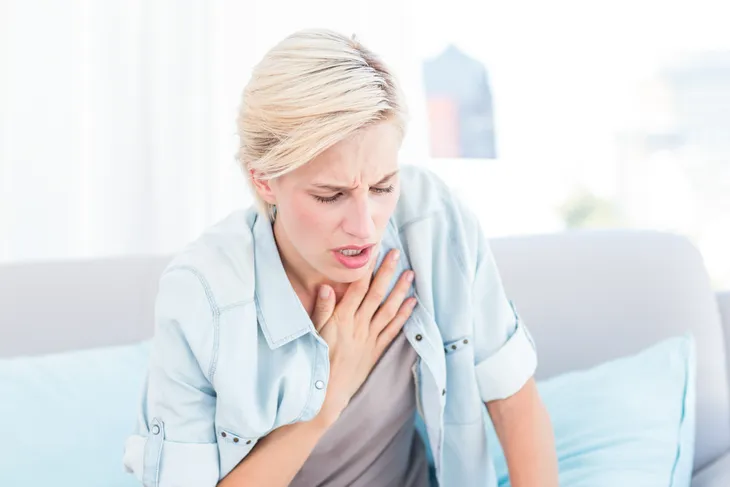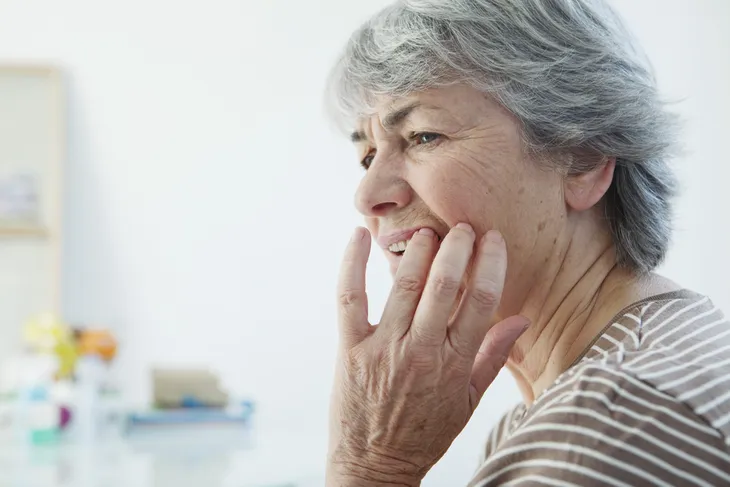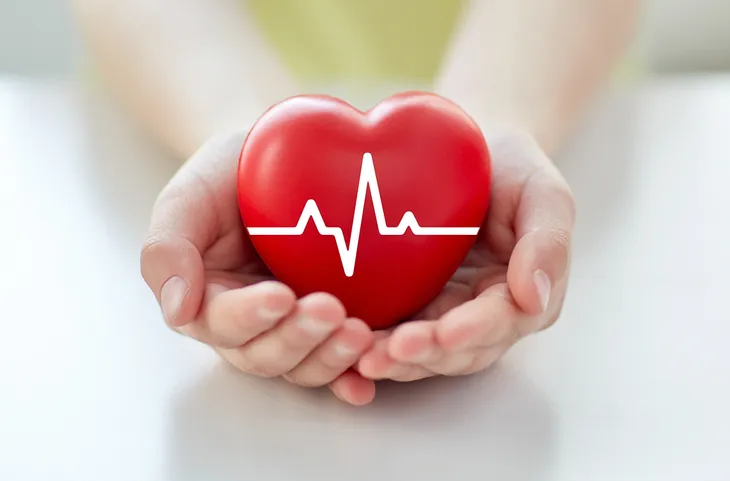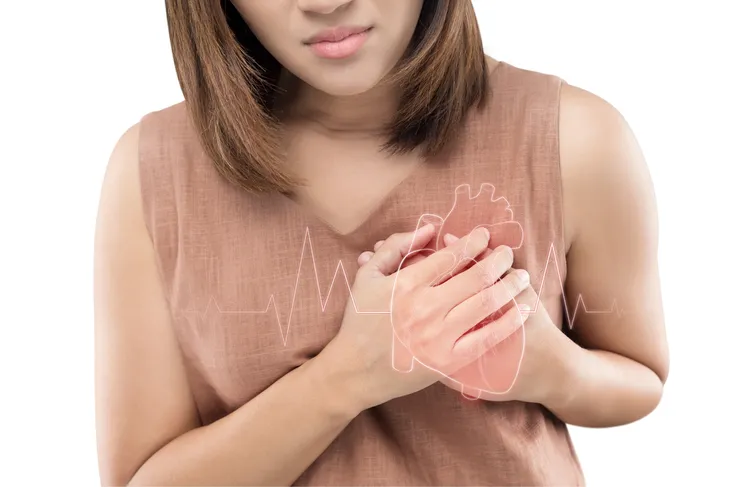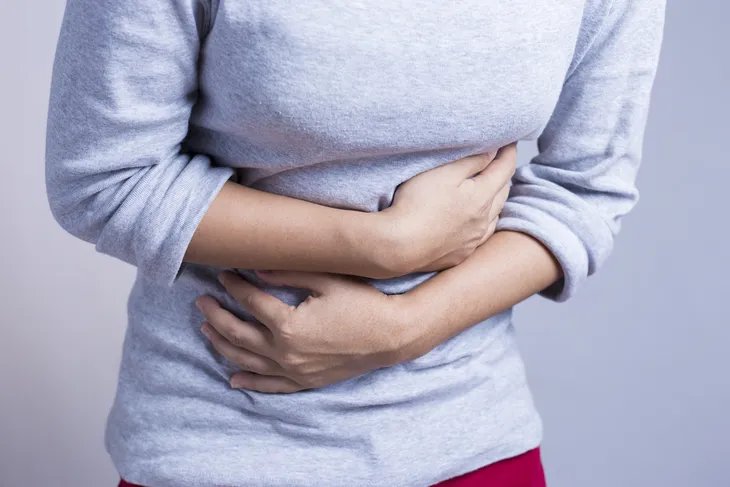Heart attacks strike quite differently when comparing the sexes. While men typically suffer suffocating chest pain, women suffer far more subtle symptoms that are often ignored until it’s too late.
Here are 15 heart attack red flags for women…
1. Breathing Difficulties
Shortness of breath is a common and very frightening precursor to a heart attack if you’re a woman. It may come on suddenly and without warning (i.e., not following physical activity) for no apparent reason. Imagine gasping for air like you’ve just run up a few flights of stairs when you’re sitting stationary.
2. Heavy Perspiration
You might break out into a cold, clammy sweat when you have to present at a company meeting. However, many women suffering a heart attack start perspiring without any stressors present. The problem is that women often mistake this as a hot flash or blame it on their menstrual cycle.
3. Disrupted Sleep
Women who’ve suffered a heart attack often recall waking up in the middle of a deep sleep unable to catch their breath. This form of sleep apnea can occur during a heart attack, compressing the upper airway and robbing the heart of essential blood flow.
4. Exhaustion
We all experience exhaustion when we burn the candle at both ends—taking care of everyone else, but ourselves. Heart attacks are sneaky in this regard, zapping women of energy, even when they’ve been getting adequate sleep and eating right.
5. Stomach Cramps
Abdominal pain that is often shrugged off (usually with the statement: “It must be something I ate!”) often ends in a heart attack for unsuspecting women. So, what you might brush off as heartburn or a nasty intestinal bug (i.e., food poisoning) may actually be a more sinister heart issue.
6. Sharp Upper Body Pain
While men may feel “the weight of an elephant” sitting on their chests, heart attacks for women often cause sharp upper body pain. It’s common for women to complain of sharp, shooting pain or dull, gradually mounting pain in the neck, upper arms, or jaw. Regardless, the pain can be so strong that it rouses you from sleep.
7. Jaw Pain
Although it is rare, a red flag for a heart attack is jaw pain. This is because when there is a problem with our heart, the nerves in that general area react, which is why we feel pain in areas other than the direct area. But because the jaw is not located in the chest, it is often another overlooked symptom for heart-related problems.
8. Rapid Heart Rate
An intensely rapid heartbeat will commonly accompany feelings of intense anxiety and sweating in women suffering a heart attack. You might think you’re having an anxiety attack, because it strikes suddenly, with your heart overexerting during a non-stressful endeavor.
9. Chest Pain
While the crushing chest pain that men experience during a heart attack is less intense for women, chest pain can still occur leading up to and during a heart attack. Although instead of pain, women feel tight discomfort that is commonly described as a full feeling across the entire chest, which is not solely on the left side of the chest.
10. Nausea
Nausea can happen for many reasons and is not a common symptom or red flag that comes to mind when we think of heart attacks. However, nausea can occur a few days before having a heart attack. And because the heart attack doesn’t happen shortly after, it often just gets chalked up to something we ate.
Improve your heart health in just five days! Sign up for our newsletter to receive our daily heart health checklist.
11. Pain in Either Arm
Many of us have heard that you might feel a sharp pain in your left arm when you are having a heart attack. In contrast, women can experience this sharp pain in either arm. So, whether you feel a strong pain in either arm, you should get it looked at immediately, especially when it occurs with other heart attack-related symptoms.
12. Neck, Shoulder, and Back Pain
In addition to the jaw pain mentioned earlier, women may also experience aches and discomfort in other areas of the body that are in close proximity to the chest, including the neck, shoulders, and back.
With neck pain, the National Heart Foundation of Australia says it may vary from “general discomfort” to a “choking or burning feeling in your throat,” while shoulder pain may be experienced as “a general ache, heaviness, or pressure around one or both of your shoulders.” Upper back pain tends to feel like a dull ache between the shoulder blades.
13. Dizziness, Lightheadedness, or Fainting
Women may also experience lightheadedness prior to having a heart attack, as well as feeling dizzy or like they may pass out. These symptoms occur due to a lack of blood flow to the brain.
While having a bout of dizziness or lightheadedness doesn’t always mean a heart attack is imminent, if it occurs in combination with other symptoms on this list (namely chest pain), it may mean the insufficient blood flow is due to a blockage of one or more of the heart’s arteries, which is what causes a heart attack to occur.
14. Vomiting
As discussed earlier, it’s possible for women to experience nausea ahead of having a heart attack, but it may not stop at simply feeling sick. For some, the nausea may become so intense that they vomit, while in some cases, women may experience indigestion and diarrhea.
Because of the nature of these symptoms, many women tend to dismiss them as being due to gastroenteritis (the “stomach flu”) or food poisoning. However, if accompanied by symptoms such as chest pain, shortness of breath, or a cold sweat, an impending heart attack is likely the cause. So, it’s important to visit a physician immediately.
15. Headaches
Headaches are another common sign of heart attacks for women to keep in mind. It’s not just any headache, though. In particular, AgingCare.com says, “…migraine headaches can be a warning sign of a heart attack.”
According to the source, “Women in particular who experience migraine with aura (a migraine accompanied by sensory symptoms, such as flashes of light, blind spots or tingling in your hand or face) can have double the risk of heart attacks.” So, if you find yourself suffering from a headache that matches this description, be sure to book an appointment with your physician right away.

